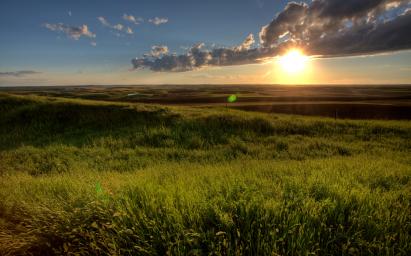Prairie Farmers
June 10th
Today, we put up a fence. It will keep our cows out of our cornfield. The cows and horses have lots of grass to eat in the prairie. It makes a great pasture. Father says it’s a good place for them. We just have a small farm because it’s hard to plow the ground. But at least we don’t have to cut down trees.
July 4th
It’s independence day. The corn is very high. The prairie grasses are even higher. I saw so many butterflies today. It was so hot that we went to the creek for the day.
August 21st
It has not rained for three weeks. I got so tired carrying buckets of water to the squash plants. I wonder how the prairie plants stay green without the rain.
September 30th
The prairie is very dry. We cleared a path between the prairie and our garden. Mother says that the lightning will catch the dry grass on fire and we need to protect our home.
October 15th
Mother was right about the fire. The lightning came. The fire burned the whole prairie. All I can see there is burned land. It’s a wonder that the plants can grow back again.
December 20th
Our fire went out today. We had to go to the Johnsons’ to get a coal to restart the fire. I’ll be more careful to watch the fire so it does not go out again.
January 20th
Another snowy day. We are almost out of fire wood. I went with Tom to look for wood. We looked near the creek. Last week we found some branches there. I guess they had floated downstream from some woods. We didn’t find any. We saw some animal tracks on the snow. They were small feet, close together
February 28th
It rained today. Most of the snow has melted. We went to visit the Johnsons. It took two hours to get there because the trail was so muddy. We almost turned back. Mr. Johnson asked us if we had seen any onions along the way. He told us that Chicago is named after onions. He said that the Potowatomi called it Checagou, which means wild onions. He said that’s because when winter ends the wild onions start to grow and you can eat them. He said it’s a sign spring is here. We looked for wild onion plants along the way back, but we didn’t see any.
March 15th
Mr. Johnson stopped to see us on his way from Chicago. He had a steel plow. He showed it to us. He told us he had gone all the way to Chicago to get it. He says it’s going to make it easier to cut through the grass so he can plant. He said if we help him with his planting, he will let us use the plow on our farm.
April 20th
We’ve borrowed Mr. Johnson’s plow. We have cleared the prairie plants from our land. Now we can grow corn on all this land. Father says we’ll sell the corn and be able to buy more animals. This will be a busy summer.
